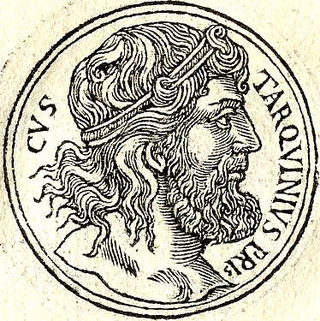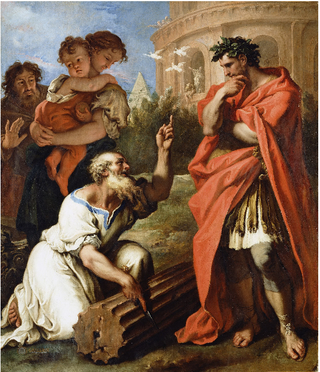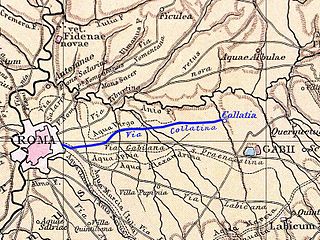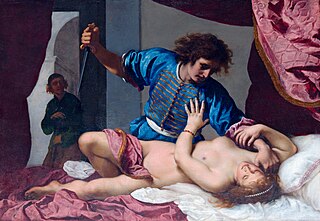
Lucius Tarquinius Priscus, or Tarquin the Elder, was the legendary fifth king of Rome and first of its Etruscan dynasty. He reigned for thirty-eight years. Tarquinius expanded Roman power through military conquest and grand architectural constructions. His wife was the prophetess Tanaquil.

Lucius Tarquinius Superbus was the legendary seventh and final king of Rome, reigning 25 years until the popular uprising that led to the establishment of the Roman Republic. He is commonly known as Tarquin the Proud, from his cognomen Superbus.

According to Roman tradition, Lucretia, anglicized as Lucrece, was a noblewoman in ancient Rome. Sextus Tarquinius (Tarquin) raped her and her subsequent suicide precipitated a rebellion that overthrew the Roman monarchy and led to the transition of Roman government from a kingdom to a republic. After Tarquin raped Lucretia, flames of dissatisfaction were kindled over the tyrannical methods of Tarquin's father, Lucius Tarquinius Superbus, the last king of Rome. As a result, the prominent families instituted a republic, drove the extensive royal family of Tarquin from Rome, and successfully defended the republic against attempted Etruscan and Latin intervention.

Lucius Junius Brutus was the semi-legendary founder of the Roman Republic, and traditionally one of its first consuls in 509 BC. He was reputedly responsible for the expulsion of his uncle the Roman king Tarquinius Superbus after the suicide of Lucretia, which led to the overthrow of the Roman monarchy. He was involved in the abdication of fellow consul Tarquinius Collatinus, and executed two of his sons for plotting the restoration of the Tarquins.

Tanaquil was the queen of Rome by marriage to Tarquinius Priscus, the fifth King of Rome.

Publius Valerius Poplicola or Publicola was one of four Roman aristocrats who led the overthrow of the monarchy, and became a Roman consul, the colleague of Lucius Junius Brutus in 509 BC, traditionally considered the first year of the Roman Republic.

The gens Tarquinia was a plebeian family at ancient Rome, usually associated with Lucius Tarquinius Priscus and Lucius Tarquinius Superbus, the fifth and seventh Kings of Rome. Most of the Tarquinii who appear in history are connected in some way with this dynasty, but a few appear during the later Republic, and others from inscriptions, some dating as late as the fourth century AD.
Gaius Papirius was pontifex maximus in 509 BC, the first year of the Roman Republic. He copied the religious ordinances established by Numa Pompilius, the second King of Rome, which his grandson, Ancus Marcius, had carved on oaken tablets, and placed in the Forum.

Collatia was an ancient town of central Italy, c. 15 km northeast of Rome by the Via Collatina.
Demaratus, frequently called Demaratus of Corinth, was the father of Lucius Tarquinius Priscus, the fifth King of Rome, the grandfather or great-grandfather of Lucius Tarquinius Superbus, the seventh and last Roman king, and an ancestor of Lucius Junius Brutus and Lucius Tarquinius Collatinus, the first consuls of the Roman Republic.

Sextus Tarquinius was one of the sons of the last king of Rome, Lucius Tarquinius Superbus. In the original account of the Tarquin dynasty presented by Fabius Pictor, he is the second son, between Titus and Arruns. However, according to Livy and Dionysius of Halicarnassus, he was either the third or first son, respectively. According to Roman tradition, his rape of Lucretia was the precipitating event in the overthrow of the monarchy and the establishment of the Roman Republic.

Lucius Tarquinius Ar. f. Ar. n. Collatinus was one of the first two consuls of the Roman Republic in 509 BC, together with Lucius Junius Brutus. The two men had led the revolution which overthrew the Roman monarchy. He was forced to resign his office and go into exile as a result of the hatred he had helped engender in the people against the former ruling house.
Arruns Tarquinius was the younger son of Demaratus of Corinth, who migrated to the Etruscan city of Tarquinii in the seventh century BC. He died shortly before his father, leaving his wife pregnant. When Demaratus died, he left no inheritance for his grandson, also named Arruns, who was thus born into poverty, although Demaratus had been wealthy. The child came to be called Egerius, meaning "the needy one."
Arruns, also spelled Aruns, is an Etruscan praenomen, thought to mean "prince." Various figures in Roman history were known by this name, including:
The gens Pinaria was one of the most ancient patrician families at Rome. According to tradition, the gens originated long before the founding of the city. The Pinarii are mentioned under the kings, and members of this gens attained the highest offices of the Roman state soon after the establishment of the Republic, beginning with Publius Pinarius Mamercinus Rufus, consul in 489 BC.

Spurius Lucretius Tricipitinus is a semi-legendary figure in early Roman history. He was the first Suffect Consul of Rome and was also the father of Lucretia, whose rape by Sextus Tarquinius, followed by her suicide, resulted in the dethronement of King Lucius Tarquinius Superbus, therefore directly precipitating the founding of the Roman Republic. It is believed that Lucretius and his accomplishments are at least partly mythical and most ancient references to him were penned by Livy and Plutarch.

The gens Lucretia was a prominent family of the Roman Republic. Originally patrician, the gens later included a number of plebeian families. The Lucretii were one of the most ancient gentes, and the second wife of Numa Pompilius, the second King of Rome, was named Lucretia. The first of the Lucretii to obtain the consulship was Spurius Lucretius Tricipitinus in 509 BC, the first year of the Republic.
Arruns Tarquinius was the brother of Lucius Tarquinius Superbus, the seventh and last King of Rome.

The overthrow of the Roman monarchy was an event in ancient Rome that took place between the 6th and 5th centuries BC where a political revolution replaced the then-existing Roman monarchy under Lucius Tarquinius Superbus with a republic. The details of the event were largely forgotten by the Romans a few centuries later; later Roman historians presented a narrative of the events, traditionally dated to c. 509 BC, but it is largely believed to be fictitious by modern scholars.

The Rape of Lucretia is any of several paintings, variations of the same subject, which are usually attributed to either Felice Ficherelli or Guido Cagnacci and dated to the late 1630s or about 1640.













